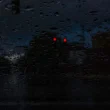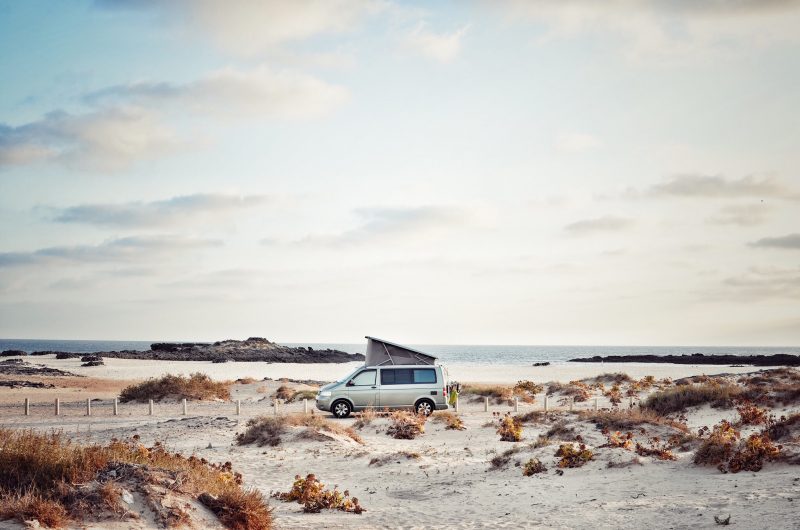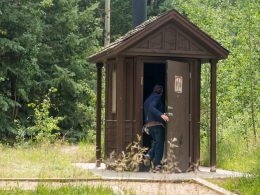Camping in the great wide-open sounds like a dream come true. Fresh air, sunshine, and just a few other souls around are part of what makes boondocking so great. But is boondocking legal where you’re hoping to stay?
It might be, but it is best to know for sure!
What is Boondocking?
Boondocking is a way to camp for free! There are plenty of places you are allowed to boondock where you won’t pay a penny. But you won’t have hookups, so you need to have a self-contained RV.
This means there’s no water, no sewer, or electric hookups provided by a park. If you want to give boondocking a try, keep reading to find out how to get started.

Is Boondocking Legal?
Boondocking is legal in some places and illegal in others. So where is boondocking legal?
Boondocking is legal on most public lands. This means you can legally boondock on most BLM land, state forests, national forests, and national grasslands.
These areas often have designated camping spots. You also need to follow rules regarding how close you are allowed to camp to bodies of water or the main road. Always check local regulations before heading out. There may be restrictions in certain locations.
Boondocking is illegal in some places, though. You can often park overnight at Walmart, Cabela’s, or even some rest areas, but most privately owned lands prohibit boondocking. Most urban and suburban areas also prohibit boondocking.
Sometimes, it is even illegal to boondock on your own private land if it is within the city limits. There are zoning regulations in most cities regarding what types of structures we can inhabit.
So, if you’re planning to boondock even on private land (with the owner’s permission) make sure it is legal in your area.
Even though boondocking is legal in many places, there are still rules you have to follow. These rules are in place to preserve the land, so it continues to be accessible for all of us.
4 Things That Are Illegal To Do When Boondocking
Here are some rules you need to be aware of while you are boondocking. These things are illegal to do when boondocking.
Dump Your Waste Water on the Ground
Even when you are out in the boonies, you are prohibited from dumping wastewater on the ground. Wastewater damages the environment and can cause illness in humans and animals.
Therefore, it is illegal to dump wastewater on the ground or in a body of water. You are ONLY allowed to dump wastewater at designated dump stations.
Leave Your Trash or Litter
Packing out your trash is one of the foundational aspects of the movement known as “Leave no Trace.” Leaving your trash when boondocking is illegal. It is harmful to the environment, and it takes away from others’ experiences.
If you plan to boondock, make sure you have a way to manage your trash so you don’t litter.

Overstay Local Stay Limits
Many local areas have restrictions regarding how long you can stay in one place. It is illegal to overstay local limits.
If you love an area, you can usually move somewhere nearby and then return. It’s important to follow these local rules so we can all continue to boondock.
Harass Wildlife or Other Campers
It is also illegal to harass people or animals when boondocking. Being away from the city doesn’t eliminate these rules. So continue to be a kind, courteous person no matter where you are.

How to Find Legal Boondocking Spots
While it is legal to boondock in many places, it’s tough to know where to go. Luckily, tons of amazing apps and websites will help you find legal boondocking sites.
One of our favorites is freecampsites.net. Other campers share their favorite spots to camp for free all across the country. Be sure to double-check the local area rules since this is a community-driven site.
Another great way to find legal boondocking spots is Campendium. You can search for both paid and free campgrounds using this site. Other reviewers will often post pictures and information regarding the site. You can even get an idea of how large of a rig a particular site can accommodate.
A few other great sites to find legal boondocking spots are iOverlander, FreeRoam, AllStays, the Dyrt, and the RV Life App.
You can also search the US Forest Service and Bureau of Land Management websites directly. Usually, these sites have details about “dispersed camping” sites in the area.
What You Need for Boondocking
Now that you know the answer to “is boondocking legal” (YES!), you’re probably excited to get started. Here are a few basics to know before you begin boondocking.
A Way to Generate Power
Since boondocking means you don’t have hookups, you need a way to generate power. The most common way to do this is with a generator or solar panels. Either option will work. They both have pros and cons, though.
If you already have a generator, you might want to use it to start. That way you can see if boondocking is for you and upgrade to solar panels if you decide you’re hooked.
A Legal Trash Disposal System
We mentioned before that it is illegal to dump your trash on the ground when boondocking. This means you need to have a way to manage and dispose of your trash. While you are out, you need a way to store your trash so your rig doesn’t get smelly. You also need to keep trash contained so animals do not get into it and litter it about.
If you return home after boondocking, you can simply toss your trash in your own garbage can at home.
But if you’re on the road for a while, you’ll need to have another plan. You could stay at an RV park every once in a while, to dump your trash and your tanks. You could also take the trash to a local dump and pay to dispose of it.

Waste Water Holding Tanks
Another thing you’ll need for boondocking is wastewater holding tanks. You need to store your grey and black water until you can get to a dump station.
It is important to conserve space, especially in your grey water tank, so you can stay out longer. And remember, it is illegal to dump your tanks on the ground. So be prepared to use your holding tanks until you can get to a dump station.
Plenty of Fresh Water
Finally, you need plenty of freshwater. Having a large freshwater tank will make boondocking much more enjoyable. You need to bring enough water for all your needs. This, of course, includes drinking water. But you will also use your freshwater tank for doing dishes, flushing the toilet, and showering.
So, is boondocking legal? It is, and it isn’t. It depends on where you are trying to camp. Boondocking is legal on most public land.
There are plenty of helpful websites that will help you find places to stay for free (legally!) Make sure you follow all local laws wherever you stay. And do your part to preserve the environment and keep boondocking legal for all of us. And as always, leave the site better than you found it.
Is boondocking legal? Now you know.
If You Love RVing, You Need to Stay Informed
Don’t rely on RV industry new sources (owned by the manufacturers) or newbie YouTubers to keep you informed with RVing news.
Stick with Nomadic News. We publish the daily articles and breaking stories that matter to your RV lifestyle.










